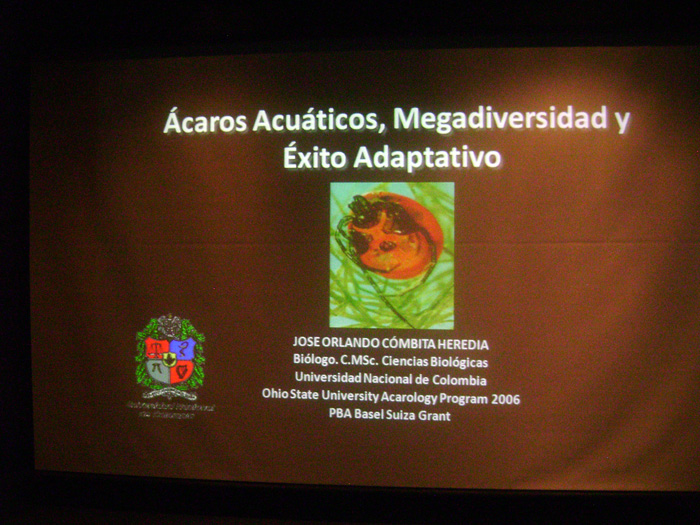José Orlando Cómbita"Heredia, biologist and MS candidate in Biology from the Universidad Nacional de Colombia, invited by the University to give a biodiversity speech, introduced to his research on aquatic acari through studies on megadiversity and explained the adaptative success of these parasites in this environment.
"It is an arachnid group that lives in aquatic environments such as waterfalls, streams, even in thermal springs. Acari belong to an arachnid group that adapted to this kinds of environments," said the biologist, who affirmed that this group has been studied at a world level, is diverse and with a great amount of species.
According to Cómbita, in Colombia several studies on acari, of agricultural relevance, have been completed. There are very few within aquatic environments, but their importance for the environment is great.
This acaris group coevoluted with insects. On its larval phase, they need to parasite an insect with an aquatic larval stage. When the insect emerges from the water, they go into another puddle; the acarus descends and goes into another nymphal state.
"Within this coevolution of acari and insects, there are specificities between some species: some acari only parasite some insect species with aquatic larval stages. Those characteristics are useful to control water quality," explained the invited researcher.
In Colombia, the last study on the subject was completed in 1953 and some species were reported. "With this project, sponsored by a Swiss organization, new species and genres will be classified, which will be very significant, for its applicability as a biologic controller of other groups," says the specialist.
The success of the adaptability of these acari is due to the fact that they developed specific feeding mechanisms; breathing, morphological and reproductive adaptations, in order to live underwater and to spread on all aquatic environments.
In the soil, they are essential for biologic control, because they process decomposing organic matter, making it smaller, so other organisms can consume it.
"In aquatic environments, they are important because they regulate nutrients cycles, feeding from smaller arthropods. There would be a great population outburst if there were not such organisms," affirmed Cómbita.
The study aims to establish the efficiency of this acarus to control mosquitos, "if we put several acari that would attack larvae from these insects, mosquito adult populations will get reduced," concluded Cómbita.
Sedes
 Correo Electrónico
Correo Electrónico
 DNINFOA - SIA
DNINFOA - SIA
 Bibliotecas
Bibliotecas
 Convocatorias
Convocatorias
 Identidad UNAL
Identidad UNAL





